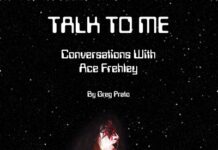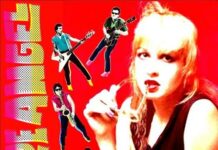Photo Courtesy of Lenny Zakatek
The Alan Parsons Project
The Turn Of A Friendly Card
In 1980, the Alan Parsons Project opted to make gambling the core concept of its fifth album. This roll of the artistic dice resulted in a major jackpot for the band.
Until this point, the underrated studio-driven progressive powerhouse — comprising the eponymous producer maestro Parsons, musician Eric Woolfson, and a round robin of multi-talented musicians and vocalists — had been steadily building up its success stateside and abroad. Beginning in 1976, the APP made sure each album released was driven by a unique concept. Their debut, Tales Of Mystery And Imagination, was directly inspired by the stories of Edgar Allan Poe. I Robot sought its storyline from Isaac Asimov’s science fiction while indirectly addressing the dangers of artificial intelligence. Pyramid focused on the notion of ascension; Eve reflected the emotional workings of the minds of women.
But by the turn of the decade, big things truly started happening for the UK-centric collective — they began hitting the U.S. airwaves with Top 40 regularity. Additionally, co-founder Woolfson finally proved able to assert himself behind the microphone.
The group’s fifth album (and arguably its best), The Turn Of A Friendly Card, bridges the gambling concept with that of salvation (physical and emotional), reflecting the highs and lows of human nature. Just look at the cover — a stained glass window depicting the King of Diamonds. Somber in its overall tone, the album nonetheless was a platinum-selling smash, producing two Top 20 singles on the Billboard Hot 100 in 1981.
“Eric had the concepts, especially on The Turn Of A Friendly Card — that was a whole experience with him living in Monte Carlo as a tax exile,” musician and APP vocalist Lenny Zakatek, lead singer on one of the album’s biggest hits, “Games People Play,” told me recently in an interview. “I don’t think he intended to write The Turn Of A Friendly Card at any other point until he lived there.”
Zakatek, whose voice previously shone through on prior APP hits like “I Woudn’t Want to Be Like You” and “Damned If I Do,” added that the sight of people gambling ad nauseum left a strong impression on Woolfson.
“Eric probably witnessed some of that,” the former vocalist for soul/dance band Gonzalez (of “Haven’t Stopped Dancing Yet” fame) said. “I think that had a profound effect on him and that’s how he came to write the album.”
Though he would sing guide vocal tracks on prior APP albums, Woolfson’s deep David Gilmour-esque voice finally makes its first appearance on The Turn Of A Friendly Card, on its second big hit “Time.” This would officially set off the band’s prolonged 1980s heyday as Woolfson’s lead vocals shone through on the group’s biggest hits of the decade, including “Eye in the Sky” and “Don’t Answer Me.”
 Photo Courtesy of Lenny Zakatek
Photo Courtesy of Lenny Zakatek
“Eric deep down always wanted to sing,” Zakatek told me. “Alan probably didn’t like his voice that much and didn’t want him to sing. We were having success at the time with Eric’s songs and Alan’s production.”
Along with being the band’s most cohesive conceptual album, The Turn Of A Friendly Card offers an emotional yin-yang of dominance and submission, complemented by prog melodies and classically-driven undertones. The human existence is reduced to a series of hard-hitting phrases: “Something’s wrong in this house today, something’s been going on, there may be a price to pay;” “Just one minute more, give me just one minute more — it’s gonna be all right!;” “You’ve got nothing left to lose;” and “Time is flowing like a river to the sea,” included. These elements culminate in a 16-plus minute five song “Turn Of A Friendly Card” suite that brings listeners into the heart of the beast, complete with jackpot bells, clinking coins, tables bustling with activity and lack of control.
One can argue other prog bands took notice and sought to incorporate the gambling motif into their future works. The best example would be Canadian quintet Saga who turned “Wind Him Up” and its harrowing tale of one man’s descent into a wheel spinning, number-driven abyss into a minor U.S. hit in 1983.
Yet dispute The Turn Of A Friendly Card’s aggressive allusions, Zakatek believes the album is riddled with a deeper beauty not showcased on other APP works.
“I love the melody on ‘Turn Of A Friendly Card’ itself. I think it’s a beautiful piece of work,” he said. “‘Games People Play’ is a great track. ‘Time’ is timeless. I love that song to death. It’s probably my favorite album.”
The group would ultimately find its greatest success in 1982 with the release of their follow-up, Eye In The Sky. Though demand for the group live never dissipated, most promotional materials surrounding the album focused squarely on the collaboration between Parsons and Woolfson. Even most of their music videos lacked band member imagery — watch the Dick Tracy-style “Don’t Answer Me” for proof.
While Zakatek wishes the group could have ridden the wave of success generated by The Turn Of A Friendly Card by playing live concerts and touring the world, he has no regrets about his tenure with the band. Should it reform or change its mind, he’ll be there to participate in the “reunion.”
“It wasn’t like we were a band that went on the road, started fighting, got sick of it and then reformed. We never went on the road to get sick of each other,” he told me. “I’m proud to have sung on the Project, proud to have worked with Alan, and sung to the writing of Eric Woolfson. It’s a dream come true. Why would you not be proud?”
***
Share your feedback and suggestions for future columns with Ira at vinylconfessions84@gmail.com.




















